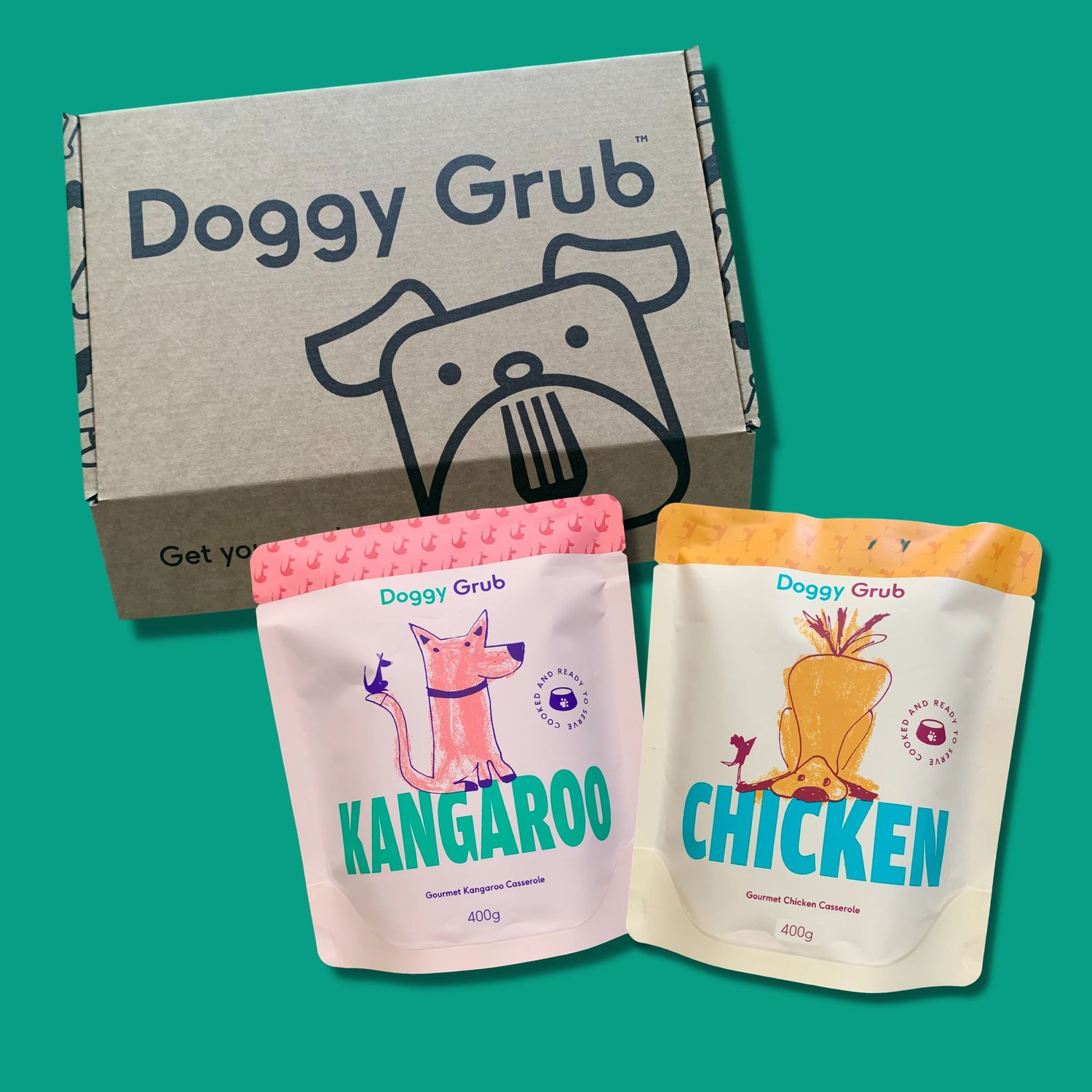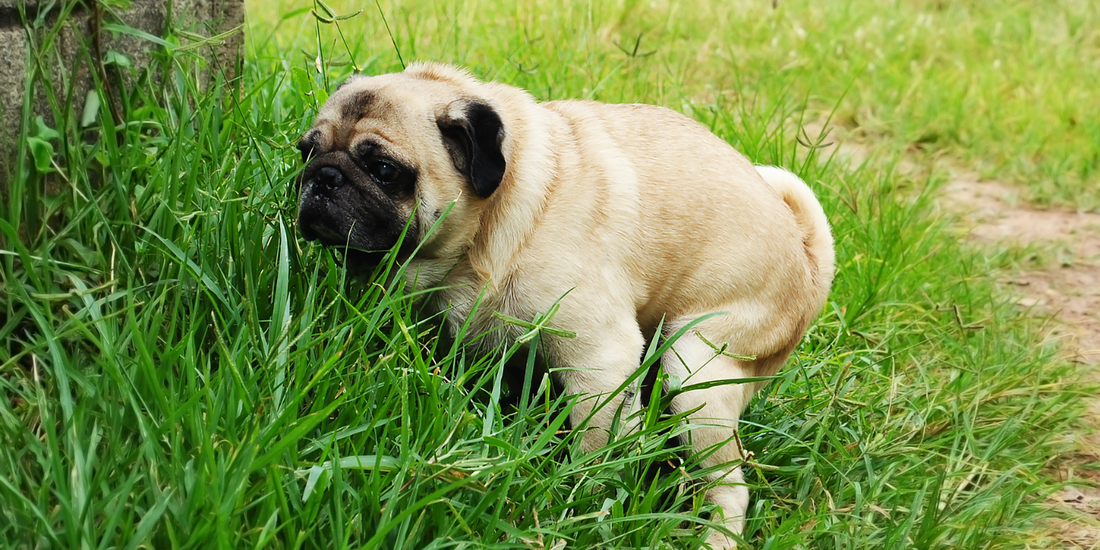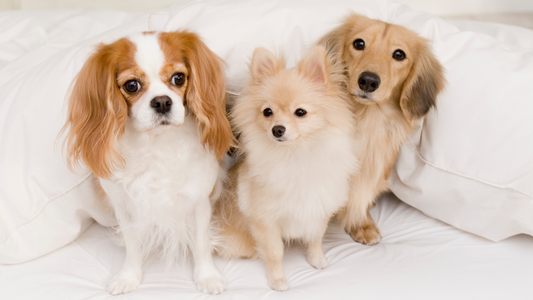At Doggy Grub, we love to talk about your dog’s poo! There is a good reason for it, and it’s not that we’re weirdly obsessed with your dog’s butt.
A healthy gut is the foundation to good health, improved immune system, reduced inflammation and increased energy!
So how can you improve your dog’s gut health? Well, we’ve got some tips for you and your pup so you can put the sloppy-poo-days behind, once and for all!
Why happens inside my dog’s gut?
Your dog has a unique collection of hundreds of different types of bacteria and other microbes (such as viruses, fungi, etc) in its gastrointestinal tract (GI Tract). That’s called the gut microbiome.
A healthy microbiome is crucial for your dog’s overall health, from nutrient absorption to mental health (have you heard that the tummy is like a second brain?).
When bacteria become out of balance, disorders such as inflammatory bowel disease (IBD), digestive issues, immune system reactions, diabetes, and even depression can result.
What are the signs that my dog has a gut problem?
Very often, pet owners don’t realise that their dog has a gut issue. Some of the signs, such a flatulence or bad breath, can be attributed to dogs just being dogs.
However, if any of the following are a common occurrence in your household, then it’s time to check the poo!
- weight loss
- vomiting
- flatulence
- soft stools
You might be surprised to hear that your dog’s poo should be firm but not too hard, easy to pick up, without leaving streaks on the floor. So, a sloppy poo is often an indication that something is the matter.

Test the poop!
If your dog continues to have tummy issues, you can ask your vet to test a stool sample to know the state of your dog’s intestinal health and see if their microbiome is diverse and balanced.
It is an easy and affordable way to gain a detailed understanding of what changes may be necessary to improve your dog’s gut flora.
Usually, the results will show one of three things:
- not a wide variety of healthy gut microbes
- an overgrowth of harmful microbes (which can be due to a bacteria)
- an imbalance in the proportion of microbes in the gut.
Tips to improve your dog’s tummy
The goal is to add good bacteria to your dog’s digestive system.
You can do this in many ways.
Healthy diet
The easiest way to keep your dog’s gut balanced is through nutrition.
A good nutrition can help prevent so many common health issues and it is super important when it comes to our dog’s digestive health.
The bacterial diversity in your dog’s gut comes from the food they eat so it is good to feed nutrients that will allow good bacteria to flourish.
- A fresh diet of varied human-grade proteins, gut-boosting veggies (leafy greens), wholegrains & fibres.
- Fermented foods such as sauerkraut, yogurt, kefir, apple cider vinegar.
- Superfoods- chlorella for example, stimulate the growth of Lactobacillus acidophilus, an important bacteria essential for maintaining a healthy intestinal tract. You can use a daily superfood supplement.
- Healthy grains. You might think that gluten-free or grain-free diets are better for your dog’s gut but whole grains are a nutritious source of vitamins and minerals and actually support the growth of beneficial bacteria in the gut.
The earlier your expose your dog to a varied diet, the better. Your pup will grow with diversity of gut bacteria.
Many dry food diets are too high in carbohydrates and sugars which promote the growth of harmful bacteria which is why we recommend a diet of fresh foods that are high in protein.
Dog mum Melissa says: “My puppy Ruby had an odour and bad flatulence. The flatulence was sometimes so bad that we couldn’t be in the same room as her! It was clearly due to the food (she was initially on a combination of wet/dry food - then just dried food) because after we switched to Doggy Grub, this problem disappeared.”
If you’re feeding a balanced diet of fresh food to your dog but keep having digestive issues, it could be food allergies or intolerance. Luckily, food sensitivities can be resolved by identifying the culprit and changing your dog’s food.
Environmental exposure
Your dog can pick up friendly bacteria on their walk: in the dirt, on plants, in the air and even by eating their own poo (yikes!).
The point is: don’t hesitate to take your dog on adventures!
What happens when there is an overgrowth of gut bacteria?
Not all bacteria are the same. Occasionally your dog might have an infection or overgrowth of harmful microbes (“bad bacteria”) that requires your intervention.
Usually, after a stool sample test, your vet will identify the bacteria and prescribe antibiotics.
Broad-spectrum antibiotics work by wiping out all bacteria, the bad ones and the good ones, that maintain your dog’s gut healthy. It’s always a good idea to add probiotics to your dog’s diet when they are on a course of antibiotics, that way, you are supporting and restoring the loss of good gut bacteria.
Now that you know all of this, we dare you not to become obsessed with your dog’s number twos!
Want to be the first to get your paws onto the hottest topics? Subscribe to our newsletter!
--------------------------------------------------------------------
The Doggy Grub blog is dedicated to helping dogs and their owners achieve happier, healthier lives, changing the way we feed our dogs one bowl at a time! If you would like to know more about our fresh food head to Doggy Grub










